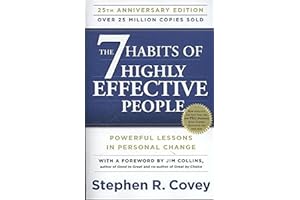One sentence summary
This international bestseller presents practical lessons that offer effective principles for transforming one’s personal & professional life by developing seven key habits that can help anyone become highly successful.
Book genre
Self-help and business
Main topic of the book
The 7 Habits of Highly Effective People: Powerful Lessons in Personal Change, by Stephen R. Covey, is a self-help and business book that presents practical lessons for transforming one’s personal and professional life by developing seven key habits that are essential for becoming highly successful.
Key ideas
The main ideas that the book covers are:
- Habit 1: Be Proactive and Take Responsibility – The fundamental idea is that individuals have control over their thoughts, feelings, and actions and must use this power to make decisions and create meaningful results.
- Habit 2: Begin with the End in Mind – This habit encourages readers to become clear and focused on their goals and to create a plan of action to realize them.
- Habit 3: Put First Things First – This teaches readers how to prioritize tasks, activities, and goals and maintain focus on the important tasks that need to be completed.
- Habit 4: Think Win-Win – In this habit, readers learn how to focus on creating solutions and outcomes that are beneficial to all parties involved.
- Habit 5: Seek First to Understand, Then to be Understood – This encourages readers to focus on empathy and understanding in order to effectively communicate with others.
- Habit 6: Synergize – This habit teaches readers how to work towards greater cooperation and collaboration in order to create positive results.
- Habit 7: Sharpen the Saw – This habit encourages readers to continually develop and nurture themselves so that they can reach their highest potential.
Main parts of the book and a short summary
The book is divided into four parts. In the first part, readers explore the foundational concepts of the seven habits, and how they can be used to create positive changes in their life. In the second part, readers look at how to incorporate the seven habits into daily life. In the third part, readers learn how to apply the seven habits to complex problems and contexts. Finally, the last part explains how to create lasting change and transformation in one’s life by consistently applying the seven habits.
Key takeaways
By reading this book, readers can expect to come away with a better understanding of the seven habits, how to apply them in their lives, and how to develop lasting transformation.
Author’s background and qualifications
Stephen R. Covey is an internationally renowned author, educator, and businessman. He is the author of several books, including the classic The 7 Habits of Highly Effective People. He has been a professor at Brigham Young University, President and CEO of the Covey Leadership Center, and is now the Executive Vice President of Franklin Covey Company.
Target audience
The primary target audience for this book is individuals who are looking to improve their personal and professional lives by understanding and applying the seven Habits of Highly Effective People. However, this book can also be helpful for business leaders, team members, and anyone seeking to become more effective in their life.
Publisher and first publication date
The book was published in 1989 by Simon & Schuster and has since become an international bestseller.

